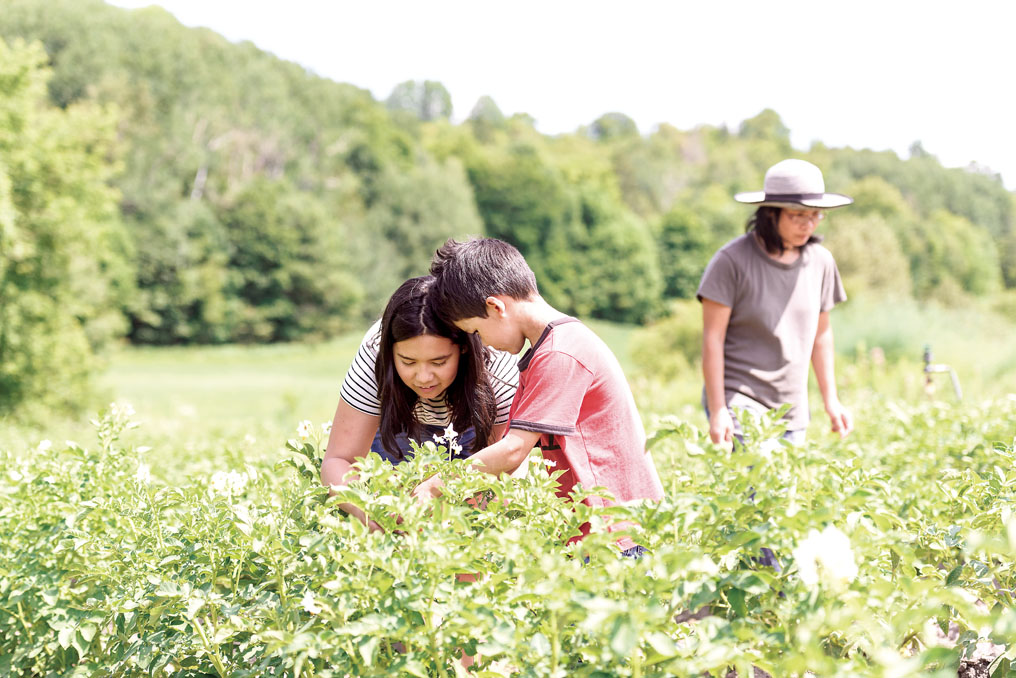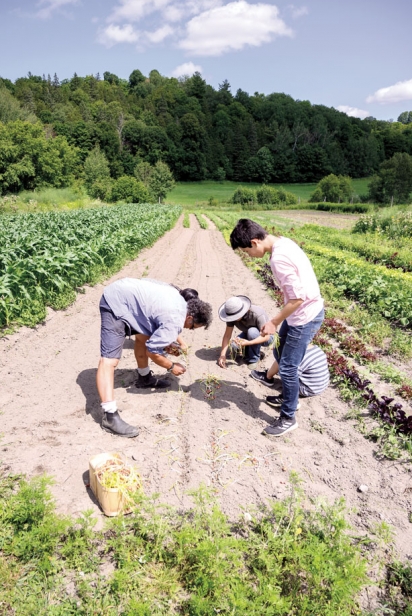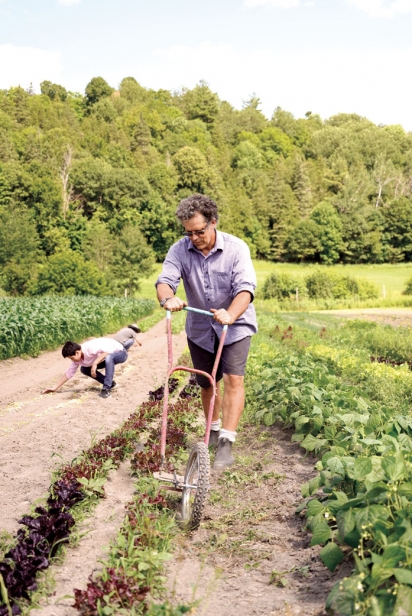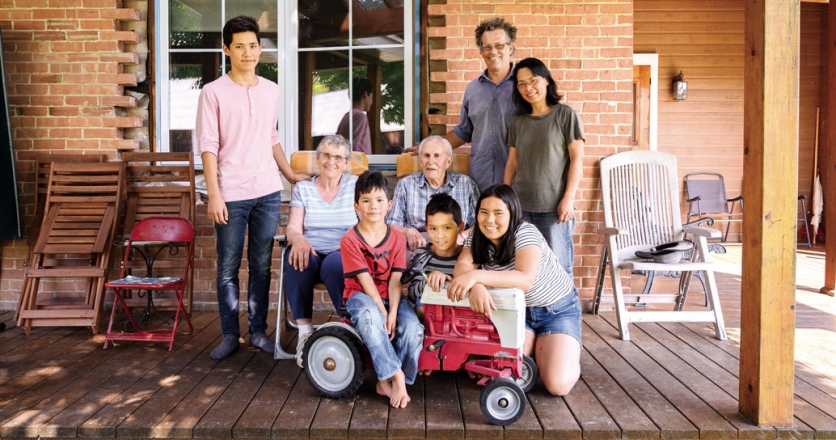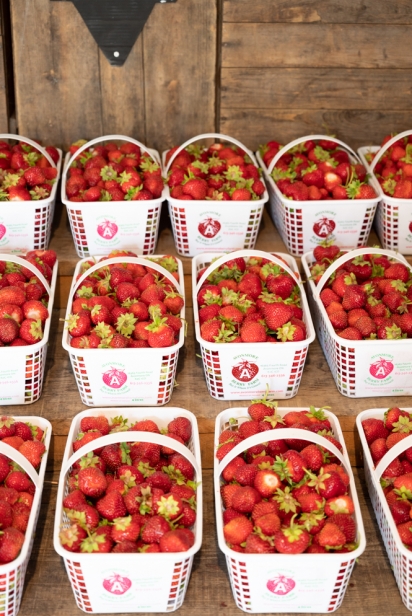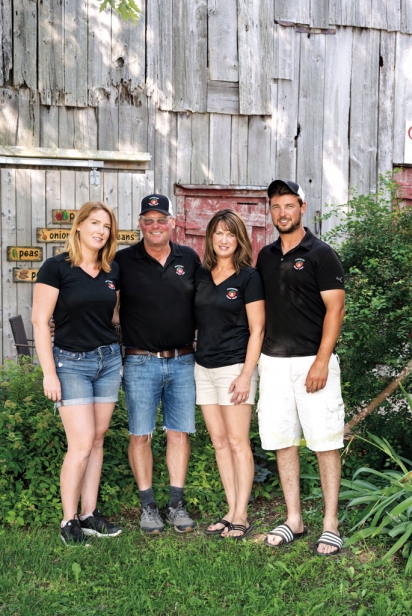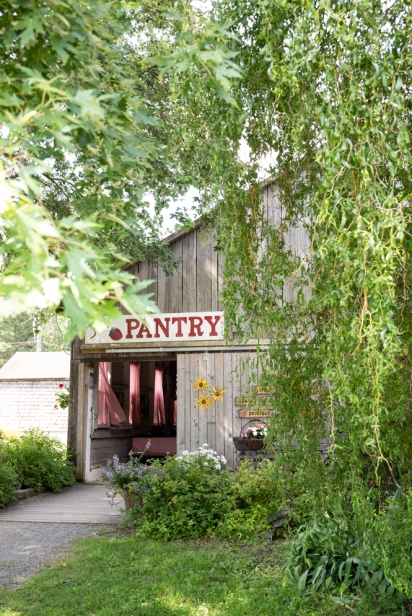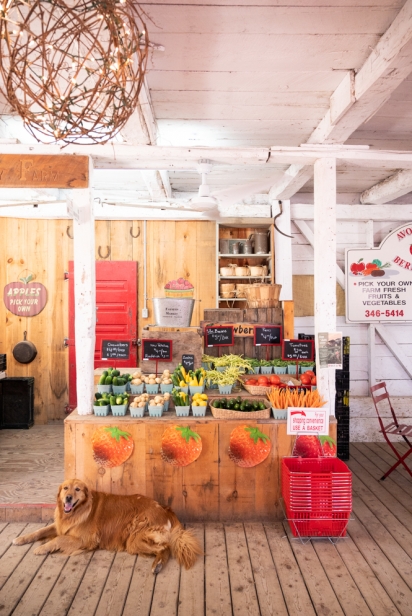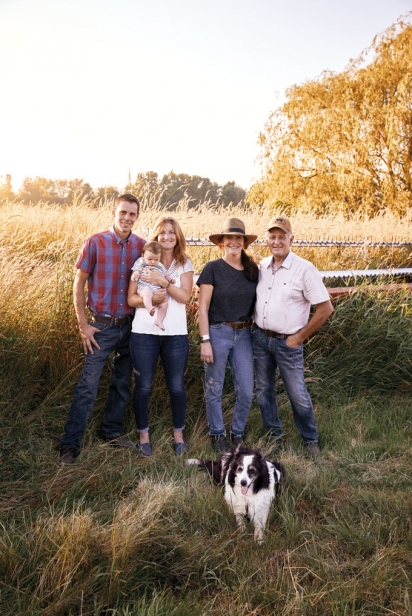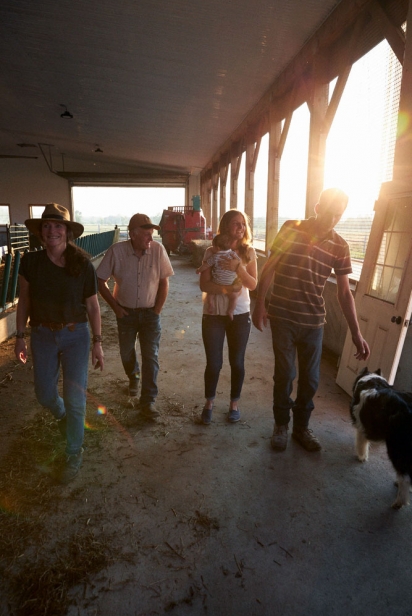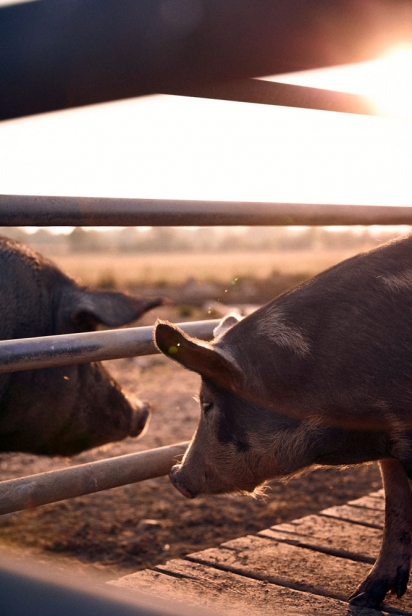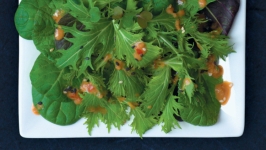A Convinent, Over Generations, with the Land
It’s a paradox. For many of us trapped in cities, we long for the countryside, access to the bucolic living of farm life, and connection to nature, to animals and our food. But for those who grew up on a farm, those who know the brutally long days in the heat and the cold, the financial pressures and the relentless nature of farm life, the city often seems a better option. Here we meet three farm families that have resisted the siren call of the city and successfully passed the family farm down over the generations.
Woods Farm
Neil Woods is a fourth-generation farmer. His land lies tucked away in a picturesque valley north of Wakefield, Que., where morning mists hang low over the land, cows bask on a sunny hillside, and the sound of sheep anticipating their morning rations reverberates in the still air. The occasional car passes by on the road above, headed for one of the nearby lakes, but it’s easy to imagine that not much has changed here since his greatgrandfather bought the land in 1861.
At that time, Canada as we know it didn’t exist. Queen Victoria was on the throne and she had not yet chosen Ottawa as the capital of this country. In 1861, the American Civil War broke out, sending draft-dodgers, deserters and black slaves on the Underground Railroad to Canada.
However, despite the ongoing political turbulence just a few hundred miles to the south, Woods’ great-grandfather raised cattle on a peaceful 100-acre parcel of land in southern Quebec. He owned a butcher shop in the village of Wakefield and another across the road from the existing farmhouse, which he kept chilled by pulling ice off one of the nearby lakes in winter and managed to make last until summer. The shops kept the Woods family going until the Second World War, when they were forced to close due to lack of available labour.
Woods’ father, Leyton, was born in the brick farmhouse in 1929, where he still lives today. He inherited it at the age of 20, when his own father passed away. The then small holding grew to 200 acres and, until 1993, the farm primarily produced milk, cream, eggs and capons, some of which ended up at the Rideau Club. “I distinctly remember going to the Rideau Club when I was very small,” recalls Woods, “and the chef there used to make me a sundae when we went in.”
Neil Woods, the youngest of three children, studied agronomy at McGill University’s Macdonald campus. “It was more theoretical than practical,” he recalls, “but I had at least been exposed to agriculture, although I never thought of doing it as a career.” However, with his elder siblings off doing other things, he finally decided, in 1995, that he was going to take over the family farm. He was considering expanding the beef herd operation, but two things changed his mind.
The first was a car accident. “On our way to an aunt’s house on Boxing Day, we had a head-on car accident and my father suffered many broken bones. Suddenly, I was in charge.” As his father struggled to get back on his feet, Woods had time to think. “I began to realize that to have only one source of income that only pays in the fall might not be such a great thing.” Obviously, some diversification was in order.
In the summer of 1996, he started planting peppers — “simply because I love peppers,” he says with a smile. At that stage, he didn’t have plans for a market garden. But in 1997, the Wakefield Farmers’ Market finally got onto its feet and Woods, who had watched his mother give away her extra produce, came to the conclusion that it was better to sell than to give away.
He started with a half acre. Now he farms two, letting one lie fallow each year, and growing organic crops on the other. He does this largely alone, with occasional help from his four children, aged from seven to 13, his 80-year-old mother Winifred, and his wife, Chi-Anh Ta. He cultivates a huge variety of vegetables that includes heirloom tomatoes, greens, cucumbers, peppers, lettuce, broccoli, carrots, squash, zucchini, leeks, garlic, potatoes and beets. Many of his sales are made through an email list of keen customers, and he sells in person at the Wakefield market on Saturdays, where he is the only vendor who has been there since the beginning. Along with many others, he’s worked hard to build it into a successful market with 52 registered vendors, 26 of whom are full-time. “I think we’ve built a really great community gathering place,” he says, with some pride.
Woods also farms a couple of other parcels of land nearby, making hay to feed the 20 Charolais and Simmental cattle that live on the farm and provide abundant fertilizer for the vegetables.
It’s no mean feat to keep any property in a family for four generations, let alone a working farm. “The biggest struggle through transition is the different approaches,” Woods says. “The younger generation wants to do things one way, but the older has their own approach. At first, my father thought I couldn’t make a living selling vegetables.”
It’s too early for Woods to say if any of his own children will choose to remain on the family land that pre-dates Confederation, “but they quite enjoy helping out when they’re not forced to do so,” he says.
Avonmore Berry Farm
In 1981, Dave Phillips’ parents moved from Toronto to a 90-acre property halfway between Ottawa and Cornwall. Neither of them had a background in farming, but his mother had a passion for strawberries and his father needed to escape a high-pressure job in the city. Phillips was 16 years old at the time.
In 1982, they had their first small harvest of strawberries. A year later, that harvest included raspberries. By 1986, they were picking apples, too. After a stint at agricultural college in Kemptville, Dave married his girlfriend Pam in 1987, and, just three years later, the couple took over the farm.
Phillip’s parents, Duncan and Lillian, passed away in 2006, too early to see their grandson, Andrew and his wife Megan, join the operation.
Now, the family owns 300 acres and farms 150, producing not only fruit, but also approximately 20 different vegetables, as well as wheat and soybeans. The Phillips’ land is blessed with four different soil types, which allows the family to grow such a wide variety of crops.
They started small, but grew quickly. In 2006, they were only selling at the Lansdowne Farmers’ Market. Today, after diversifying their crops so as to fill the entire growing season, they are selling at five regional farmers’ markets, as well as through a roadside stand in Cornwall and the Phillips’ own farm store, The Pantry. And that’s to say nothing of the onfarm bakery, as well as the farm-to-table dinners prepared at Avonmore by Julia Graham, the owner of The Quirky Carrot in Alexandria. But most importantly, they also opened the doors to their land.
“We try to keep the place very tidy,” Phillips says, “and families love to come out to visit.” Avonmore offers U-pick strawberries, raspberries, apples and pumpkins, as well as a children’s play area, a picnic area, wagon rides in apple and pumpkin season and ice cream cones at The Pantry.
The store sells fruit pies, muffins, biscuits and jams, all made on the farm by Pam. “There’s little to no waste,” Phillips says, “because we turn any leftover fruit into baked goods and jams to sell in The Pantry.”
This is a farm and a family built on the back of the fickle strawberry. Close to 25 per cent of the Avonmore business rests upon these sweet berries, a harbinger of summer. “It’s a white-knuckle crop,” Phillips says. “You really have to nurture the plants, weeding, guiding the runners, covering them with straw in the winter — and even when you’ve done all that, you can lose a crop to insects or a whole field to winter kill.”
As for the future? Well, it’s in safe family hands, “but it’s hard to step back and let the next generation make the decisions,” Pam says. “There are a lot of legal and financial recommendations, but stepping back is more about the emotion and dedication you have to your family business.”
Avonmore Berry Farm
16365 4 Rd, Avonmore, Ont.
avonmoreberryfarm.com | 613.346.2336 | @avonmoreberryfarm
Sonset Farm
Andrea Cumpson isn’t exactly sure what year her father-inlaw bought the first parcel of land that is the bedrock of the 400 acres they now own, much as she isn’t entirely sure if her four-month-old grandson will take over the farm some day. “It’s a bit early to tell,” she says with a smile.
But these things aren’t terribly important in the larger scheme of things. What matters is that the Cumpson family is on a trajectory that should allow them to sustain a family livelihood over several generations, if family members continue to hope for that. “It is our goal on Sonset Farm to create a sustainable agricultural system. We farm with daily consciousness of the interconnectedness of plants, animals and human beings,” reads the opening statement on the Sonset website. “Through this philosophy of working in harmony with nature, we are keeping the soil alive and flourishing to provide our family and yours with nutritious whole foods. Our organic farming practices include the use of a diverse mixture of plants in field rotation, use of green manure crops and composted manure from our own livestock, careful tillage practices and keen observation.”
Clifford Cumpson, born in 1907, purchased the original 100-acre plot sometime in the 1940s — and he was 50 years old when his son Orrie was born. When Clifford died, Orrie was just 20 years old and suddenly in charge of the farm on which he’d grown up. In 1983, Orrie married Andrea, and they’ve been building the farm for the next generation ever since. “It’s been challenging,” she says. “There’s not a day that goes by, however, where we don’t believe that we are working for something bigger. We hope we are navigating it right.”
Now, they farm 800 acres in and around Inverary, in the country north of Kingston. “We’re incredibly lucky,” says Andrea, “as we try to keep the land as close to the original farm as possible. It’s all in the area.” To that end, in 2011 when the next-door property, Son Ridge Stables, came onto the market, they bought it and placed it in the caring hands of their daughter-in-law, Hailey, wife of their son Charlie and mother of four-month-old Nathan. Hailey now runs the stables as a horse-boarding and training facility. Thus, two generations now farm side-by-side, running an operation of unusual diversity. “To have the next generation, that’s the direction we believe you have to go,” says Cumpson, who adds that the farm’s diverse production portends well for the long run. “All the different parts mean that we don’t have to rely on the supply-management system — and, at the end of the day, it’s better for us and the health of the land. It also offers something to our community.”
At Sonset, everything revolves around the cows. They keep a mixed milking herd of approximately 40 head, including Holsteins, Jerseys and Short Horns, and sell the milk to the organic co-operative, hoping that it ends up at Organic Meadows, the local cream and milk producer. “The cows are crucial to how everything else works on this farm,” says Andrea. “They produce a milk cheque we can rely on and they also play a key role in the health of the farm. They are the epicentre, the energy. And they produce manure, which is essential to the land — and we can be organic because of it.”
Sonset keeps a small beef herd of 20 in the pasture and in a recently built, off-the-grid barn. It also has a few pasture-raised pigs and close to 3,000 chickens for eggs and meat. The family harvests hay to feed the livestock and also grows oats, barley, rye and corn to feed the animals, soybean as a cash crop, buckwheat as a green manure, as well as Emmer wheat and spelt, some of which they mill onsite. “Everything brings its own special qualities,” Cumpson says.
“We have a passion for what this land can offer. I’d like to think that these generational farms can carry on, but there are a lot of pressures that make it very hard for the young — financial pressures, the cost of machinery, the hard physical work, no benefits, development pressures, endless paperwork, buying out parents and siblings, vulnerable markets and the high risks.
“If you don’t have that drive and you don’t love it and appreciate it in depth, you’re not going to choose this as a way to live.”
Sonset Farm
4403 Latimer Road, Inverary, Ont.
sonsetfarm.com | 613.353.2260 | @sonsetfarm


